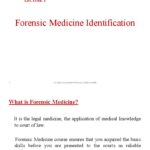The allure of forensic biology lies in its unique intersection of scientific rigor and the pursuit of justice. It’s a field where microscopic clues whisper narratives, where DNA becomes a silent witness, and where biological expertise can be the linchpin in unraveling the truth. Forget the simplistic portrayals often seen on television; the reality of becoming a forensic biologist is a demanding, intellectually stimulating, and deeply rewarding journey. But how does one traverse this path? Let’s dissect the essential components, from foundational education to specialized training, and the multifaceted skills required to thrive in this demanding profession.
Laying the Foundation: Educational Imperatives
The bedrock of any successful forensic biology career is a robust educational background. A bachelor’s degree in a relevant scientific discipline is non-negotiable. Consider majors such as biology, forensic science, biochemistry, or even genetics. These programs provide the necessary foundational knowledge in areas like cell biology, molecular biology, and human anatomy and physiology. A strong grasp of these principles is indispensable for understanding the complexities of biological evidence encountered in forensic investigations. Coursework should also include extensive laboratory experience. The ability to meticulously perform experiments, analyze data, and troubleshoot technical issues is paramount. Exposure to techniques like polymerase chain reaction (PCR), DNA sequencing, and microscopy is highly advantageous. Furthermore, consider supplementary coursework in statistics and criminal justice, these will provide a holistic understanding of the investigative process.
Graduate studies are often a prerequisite for more advanced roles and specializations within forensic biology. A master’s degree in forensic science, with a concentration in biology or DNA analysis, provides specialized training in the application of biological principles to legal contexts. These programs typically incorporate advanced coursework in forensic genetics, serology, and forensic toxicology. Crucially, they offer hands-on experience in analyzing casework samples, interpreting DNA profiles, and preparing expert witness testimony. Doctoral degrees, while not always mandatory, are highly beneficial for research-oriented positions or academic careers. A Ph.D. in a related field allows for in-depth exploration of specific areas within forensic biology, such as developing new DNA analysis techniques or studying the postmortem interval.
Honing Essential Skills: A Multifaceted Approach
Beyond academic qualifications, a specific skillset is essential to become a proficient forensic biologist. Critical thinking skills are paramount. The ability to analyze complex data, identify patterns, and draw logical conclusions is crucial for interpreting biological evidence and reconstructing crime scenes. Meticulous attention to detail is indispensable. Forensic investigations often hinge on subtle nuances in biological samples, and even minor errors can have significant consequences. Strong communication skills, both written and oral, are vital. Forensic biologists must be able to clearly and concisely articulate their findings to investigators, attorneys, and juries. This includes the ability to prepare detailed reports, present expert testimony in court, and explain complex scientific concepts in layman’s terms. Experience with laboratory techniques such as DNA extraction, quantification, amplification, and capillary electrophoresis is mandatory. Proficiency in interpreting DNA profiles, conducting statistical analyses, and using forensic DNA databases like CODIS is equally important. Maintaining chain of custody is imperative to ensure that evidence is admissible in court. Furthermore, ethical considerations play a vital role in forensic biology. Maintaining objectivity, avoiding bias, and adhering to strict ethical guidelines are paramount for ensuring the integrity of the scientific process and the fairness of the legal system.
Gaining Practical Experience: Internships and Beyond
Academic credentials and theoretical knowledge are insufficient without practical experience. Internships in forensic laboratories, medical examiner’s offices, or crime scene investigation units provide invaluable opportunities to apply classroom learning to real-world scenarios. These internships allow aspiring forensic biologists to observe seasoned professionals, participate in casework analysis, and gain firsthand experience with laboratory procedures and protocols. Volunteer work in related fields, such as working in a research laboratory or assisting with DNA testing projects, can also enhance one’s skillset and broaden one’s exposure to the forensic sciences. Networking with professionals in the field is crucial for career advancement. Attending forensic science conferences, joining professional organizations like the American Academy of Forensic Sciences (AAFS), and participating in workshops and training programs can help aspiring forensic biologists connect with potential mentors, collaborators, and employers.
The Path to Certification and Specialization
Certification can significantly enhance a forensic biologist’s credibility and career prospects. Several organizations offer certification programs for forensic scientists, such as the American Board of Criminalistics (ABC) and the American Society for Clinical Pathology (ASCP). These certifications typically require a combination of education, experience, and passing a comprehensive examination. Specialization within forensic biology allows for focused expertise in a particular area, such as DNA analysis, forensic toxicology, or forensic anthropology. Obtaining specialized training and certification in a specific area can enhance one’s marketability and open doors to more advanced career opportunities. For example, a forensic biologist specializing in DNA analysis might pursue certification as a Certified DNA Analyst through the ABC. Continuous professional development is crucial for staying abreast of advancements in the field. Forensic biology is a rapidly evolving discipline, with new technologies and techniques constantly emerging. Attending workshops, conferences, and training programs, and engaging in self-directed learning, are essential for maintaining competency and staying at the forefront of the field.
Navigating the Ethical Labyrinth
The weight of responsibility is immense. Forensic biologists contribute directly to the pursuit of justice. A single misstep, a biased interpretation, or a lapse in ethical judgment can have profound consequences, potentially impacting lives and altering the course of legal proceedings. The commitment to impartiality is not merely a professional obligation; it is the very essence of the role. One must actively guard against cognitive biases, personal beliefs, and external pressures that could compromise objectivity. Upholding the integrity of the scientific process is paramount, ensuring that conclusions are based solely on empirical evidence and sound scientific principles. Chain of custody must be rigorously maintained. Every step of the evidence handling process, from collection to analysis, must be meticulously documented to ensure the integrity and admissibility of the evidence in court. Confidentiality is also of utmost importance. Forensic biologists often handle sensitive and private information, and maintaining confidentiality is essential for protecting the privacy rights of individuals involved in legal investigations.
The journey to becoming a forensic biologist is challenging. However, for those with a passion for science, a commitment to justice, and an unwavering dedication to ethical principles, it offers a profoundly rewarding career path.










Leave a Comment